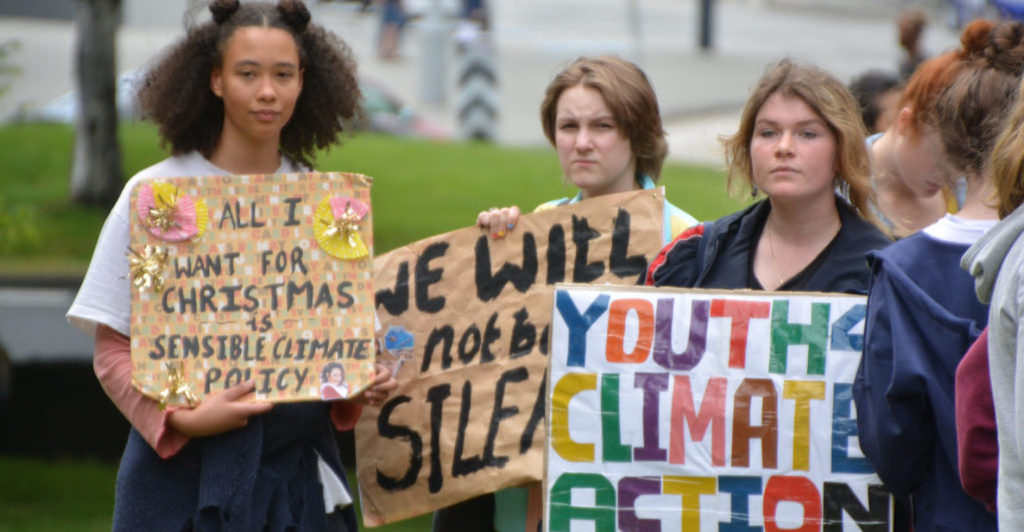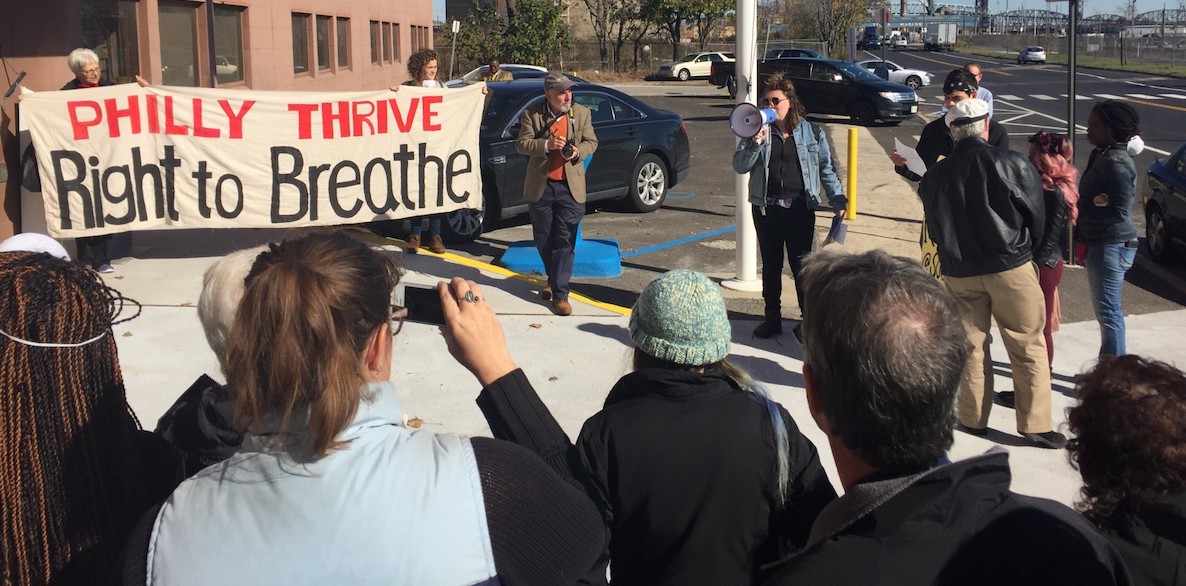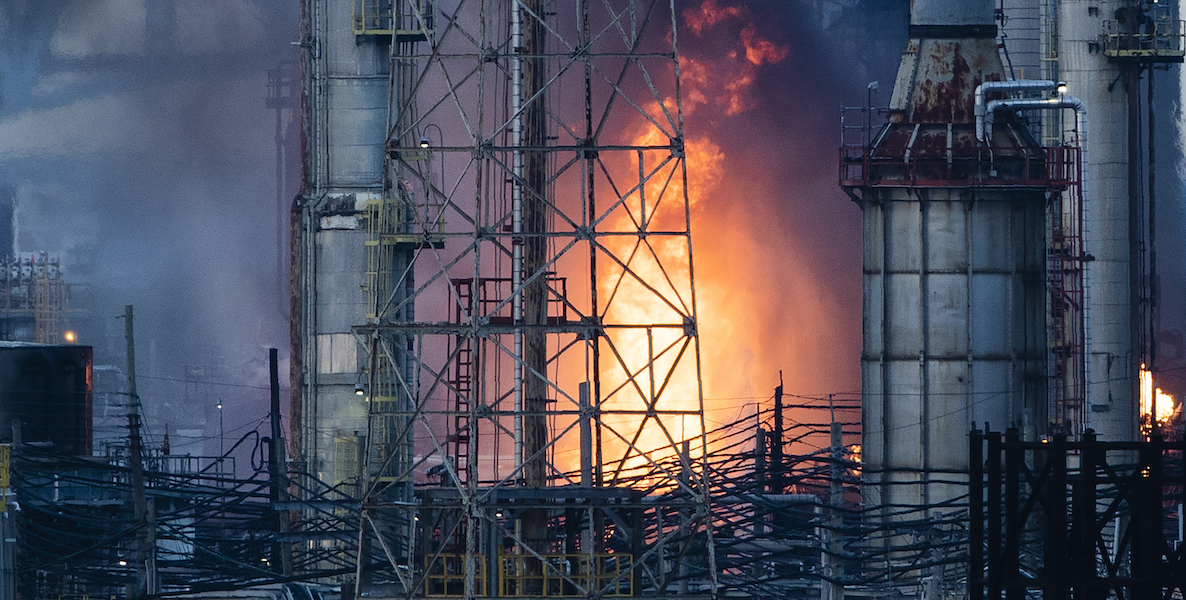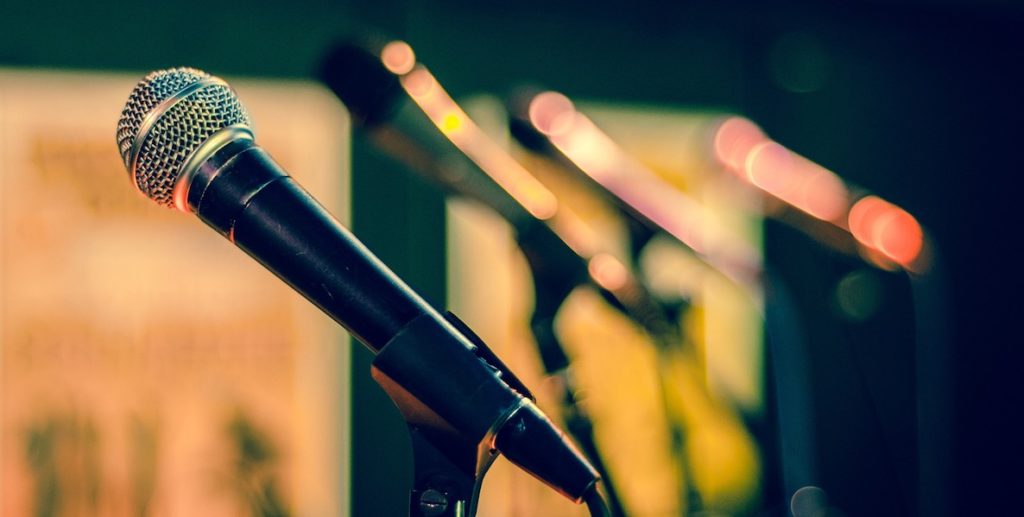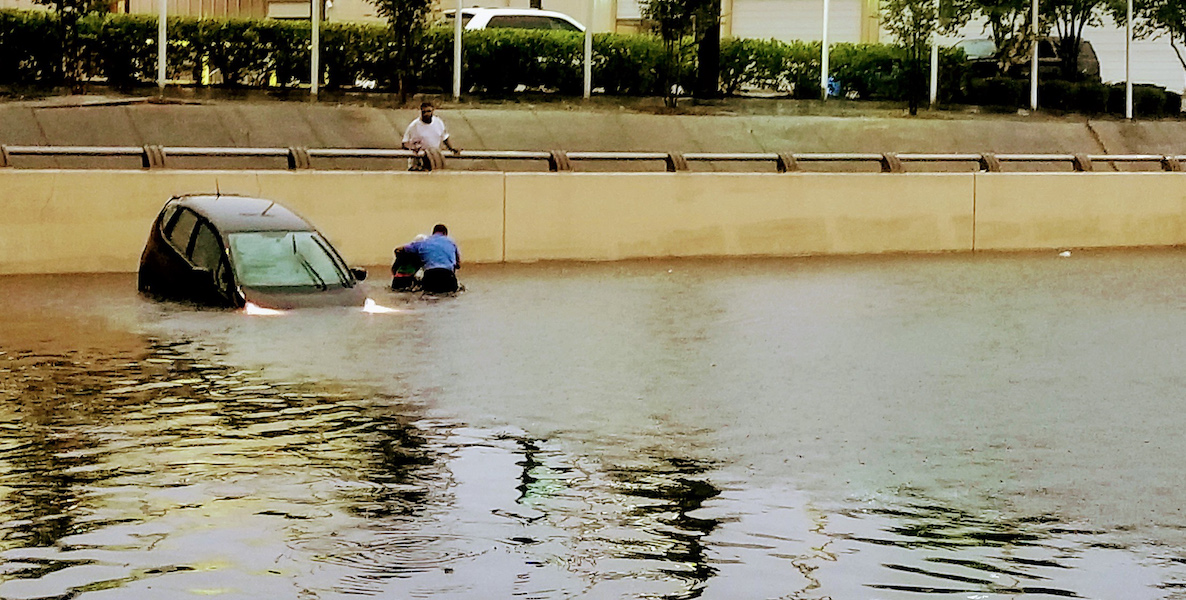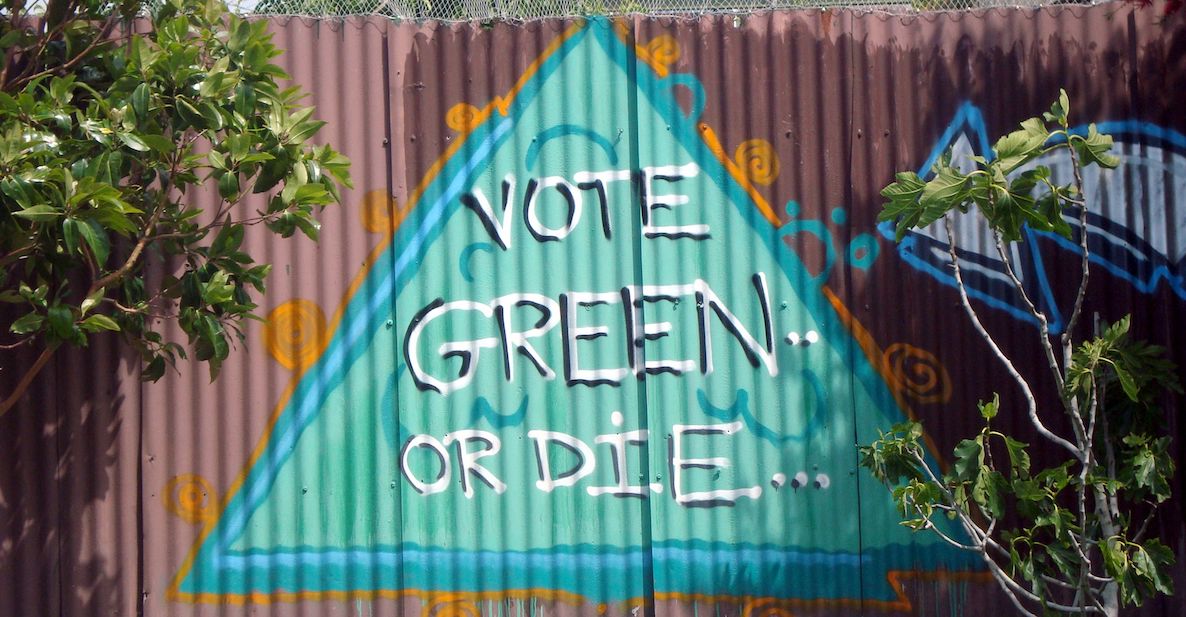Bad enough that the current president is comfortably deprioritizing climate change—now climate crisis—from being the major all-hands-on-deck global emergency that it must be. And worse still that there is no one else in his Republican Party, even those contemplating primary runs against him, brave enough to challenge him head on with the issue of climate-driven planetary disaster as a lead campaign platform. Anyways, well, we’d expect that.

Prefer the audio version of this story? Listen to this article in CitizenCast below:


But, it’s really that bad and much worse when Democrats, as an official stance, also pull away from climate crisis as a priority.
When the Democratic National Committee met last week and nixed a proposed single-issue 2020 candidates debate on climate issues, it sent a signal that it is afraid to wade into a conversation that America needs to have. There was a hope that, at least, one of the major political parties could show a basic level of consensus around what is, clearly, the most existential threat facing the only planet we can live on (outside of a known asteroid heading our way or a flotilla of hostile alien warships). After all, the next President will have to move the needle on climate crisis if we hope to impact the 10 year “event horizon” window (which might be narrower than we think) established by the Intergovernmental Panel on Climate Change.
![]() If Democrats are able to agree on one thing, it should be climate crisis, right? It’s like that one talk you’ve got to have with the kids, the talk you can’t opt-in to or avoid. We need to urgently address it with everything humanity’s collective talent can offer. Using that as a foundation, the Democratic nominee could then illustrate the dangers of doing nothing, mobilize both party base and other voters into supporting climate crisis as a key issue, and swiftly dethrone the climate skeptic residing in the White House now. With Trump gone, federal resources can get back to the pressing business of saving Earth.
If Democrats are able to agree on one thing, it should be climate crisis, right? It’s like that one talk you’ve got to have with the kids, the talk you can’t opt-in to or avoid. We need to urgently address it with everything humanity’s collective talent can offer. Using that as a foundation, the Democratic nominee could then illustrate the dangers of doing nothing, mobilize both party base and other voters into supporting climate crisis as a key issue, and swiftly dethrone the climate skeptic residing in the White House now. With Trump gone, federal resources can get back to the pressing business of saving Earth.
Apparently, according to some DNC memo the rest of us didn’t get, that was never the plan. Instead, Democratic Party brass, in a move that puts political calculus over the survival of the human species, voted against the resolution that would have formally created the first—and needed—presidential cycle debate exclusively devoted to the climate.
The series of missteps and unforced errors leading to that moment is somewhat unclear: for the most part, a climate-anxious public and especially Democratic primary voters, had already expected a climate debate. Still, something was fishy when the DNC announced it wasn’t allowing Washington Gov. Jay Inslee, the only climate-exclusive candidate in the primary pack, to participate in the only debate exclusively devoted to … the climate. Adding insult to injury, Sen. Kamala Harris simultaneously rejected her climate debate invitation in favor of a schedule-conflicting fundraiser that landed on the same night. These showed up as the first signs that Democratic leaders really don’t consider climate crisis a thing despite the warnings about it from protesting teens, scientists and ornery progressives. The stunning 17-8 DNC resolutions committee meeting vote made that official.
Nearly 75 percent of Black voters say they are either “very concerned” or “somewhat concerned” about climate crisis. And nearly 80 percent say they are feeling the effects of it. What’s more, nearly 90 percent of Democratic voters and a full 60 percent of Independents express high rates of concern on climate change.
Reports say that senior Joe Biden campaign advisor Symone Sanders—formerly a senior advisor to Bernie Sanders 2016 campaign—pushed hard for the resolution’s destruction. It would be, as she was quoted in a HuffPost report, “… dangerous territory in the middle of a Democratic primary process.” But, as someone being the key internal advisor building Biden’s Black outreach efforts, Sanders’ stand on that is stunningly bloated with ignorance at best, irresponsible and unnervingly shortsighted at worst. The issue of climate crisis actually enters enormous opportunity “territory” for any candidate taking on Trump and looking to amass a movement around what is, inarguably, humanity’s biggest danger.
Based on science and impact, dealing with the environment—particularly the state of the climate—is the most crucial issue facing Black people in the United States today. And Black voters know it. A recent YouGov-Economist poll shows nearly 75 percent of Black voters—compared to 66 percent of either White or Latino voters—saying they are either “very concerned” or “somewhat concerned” about climate crisis. And nearly 80 percent say they are feeling the effects of it. What’s more, that same poll shows nearly 90 percent of Democratic voters and a full 60 percent of Independents (the so-called “swing” voters) expressing high rates of concern on climate change. So, what drove the DNC’s decision?
![]() Perhaps the hesitation on pushing forward with climate crisis as a key 2020 campaign topic stems from Democrats’ inability to craft a message on it, much less craft a counter to Republicans who’ve effectively labeled climate crisis response as a “socialist” pipe dream. Much of that fear is driven by the spectacular fail of a public communications rollout that was “The Green New Deal.” While that may have raised lead advocate Rep. Alexandria Ocasio-Cortez’s (D-NY) national profile, it didn’t do anything for the rest of us. Alternatively, it ended up offering Republicans an opening to not only lampoon the effort as hemp granola-crunching liberal fantasy, but to splash ample public doubt on the whole notion of a needed national response, to the point of legislative lethargy. Still, Democrats could clap back with equal vigor a message that not only makes the direct connection between catastrophic global climate changes and our everyday quality of life.
Perhaps the hesitation on pushing forward with climate crisis as a key 2020 campaign topic stems from Democrats’ inability to craft a message on it, much less craft a counter to Republicans who’ve effectively labeled climate crisis response as a “socialist” pipe dream. Much of that fear is driven by the spectacular fail of a public communications rollout that was “The Green New Deal.” While that may have raised lead advocate Rep. Alexandria Ocasio-Cortez’s (D-NY) national profile, it didn’t do anything for the rest of us. Alternatively, it ended up offering Republicans an opening to not only lampoon the effort as hemp granola-crunching liberal fantasy, but to splash ample public doubt on the whole notion of a needed national response, to the point of legislative lethargy. Still, Democrats could clap back with equal vigor a message that not only makes the direct connection between catastrophic global climate changes and our everyday quality of life.
This is particularly true of the Black population. Nearly 40 percent of African Americans are concentrated in high impact climate-crisis zones hit regularly by hurricanes, tornados, flooding, polar vortexes and heat waves. Massive hurricanes battering Southern U.S. and Eastern seaboard coastal communities cause havoc for all populations, but Black populations—the least able to recover economically from that same havoc—are the most displaced (just recap Hurricane Katrina). Many of the constant, debilitating chronic diseases, respiratory illnesses and public health calamities disproportionately afflicting Black populations are either a direct result of climate crisis or the pollution—such as natural gas producing methane—that exacerbates the climate problem. Even rising violent crime in cities like Philly, Chicago, D.C. and Baltimore partly results from the rising temperatures and suffocation of urban heat island phenomenon worsening as global temperatures climb.
Black political leadership and most media, either here or nationally, haven’t made this a top issue yet, despite the overwhelmingly disproportionate impact climate crisis-instigated disasters have on Black populations.
In Philadelphia, as other Reality Check columns have pointed out, you can take air quality as an example. Philly is “ranked 12th for particle pollution year-round and 24th for days with high ozone pollution,” according to a 2018 American Lung Association report. It made a top six list of most polluted major cities east of the Mississippi River. This helps explain why asthma rates are so high, especially in the most economically distressed areas where air quality is worse. Indeed, the Asthma and Allergy Foundation ranked Philadelphia 4th out of a list of 20 “asthma capitols” throughout the nation. It also offers greater context surrounding persistent struggles with high poverty, high asthma, high respiratory illness and high cancer rates in places such as those South Philadelphia neighborhoods impacted by high polluting oil refineries.
But Black political leadership and most media, either here or nationally, haven’t made that a top issue yet, despite the overwhelmingly disproportionate impact climate crisis-instigated disasters have on Black populations. If Sanders and others in the Black political space aren’t hearing this as a priority issue on, say, The Breakfast Club; or no celebrity like Ava Duverney or Tyler Perry has yet crafted slick cinematic offerings illustrating climate crisis as a Black issue; or Beyonce didn’t yet devote a track to it; or a prominent Black celebrity or athlete hasn’t yet took a knee or wore a creative t-shirt about it, climate crisis as a top Black issue doesn’t exist. Indeed, climate crisis doesn’t even show up as a major agenda item at the august annual gathering of Black political elite known as Congressional Black Caucus week. Hence, the misguided impression—despite polls—is that the Democratic Party’s most reliable electoral base, the African American electorate, is generally dismissive of environmental issues, more so climate change. Sanders, perhaps unknowingly, just channeled that.
The other problem is media coverage and pop culture discourse around climate crisis. Mainstream narratives too often give us all the sense that it’s a crisis primarily confined to either beach property owning middle-class Whites, the mysterious green Amazon rainforest thousands of miles away or distressed polar bears and dead salmon strewn across the Alaskan tundra. Those might be important and alarming features of what’s happening to the planet, but that’s not hitting average citizens or the mass electorate in a deeply personal way. It’s not showing, for example, the children who suffer from asthma during heat waves or the faces of lost jobs and faltering economy during intense hurricane seasons and winters.
![]() Public discussion on the environment must capture what all populations are going through and how those experiences are translating into vast socio-economic hardship, particularly for Black and Brown Americans. When we’re not seeing those stories, neither are the politicians and candidates who make decisions on how society responds to them.
Public discussion on the environment must capture what all populations are going through and how those experiences are translating into vast socio-economic hardship, particularly for Black and Brown Americans. When we’re not seeing those stories, neither are the politicians and candidates who make decisions on how society responds to them.
It’s not too late. The Presidential campaign is just getting underway, and this issue is not (unfortunately) going anywhere. Georgetown University’s Institute of Politics and Public Service has invited all the major candidates, from both parties, to a climate change forum next month to be moderated by MSNBC’s Ali Velshi (a Citizen board member) and Chris Hayes. (It will be streamed on NBC News Now and aired on Velshi’s and Hayes’s MSNBC programs.) It’s not slated as a “debate”—nor an official DNC-affiliated event—but as a forum, a distinction that may speak to the larger point: There is no debate to be had about our climate anymore.
This is something Black voters already know. It’s time our politicians caught on, too.
Charles D. Ellison is executive producer and host of “Reality Check,” which airs 4 to 7 p.m. Monday through Thursday on WURD Radio (96.1FM/900AM). Check out The Citizen’s weekly segment on his show every Tuesday at 6 p.m. Ellison is also principal of B|E strategy and the Washington correspondent for The Philadelphia Tribune. Catch him if you can @ellisonreport on Twitter.
Photo courtesy Bart Everson / Wikimedia Commons

